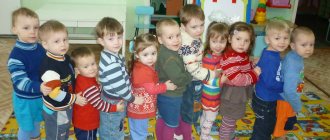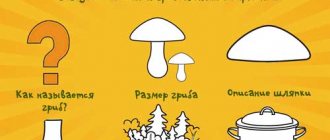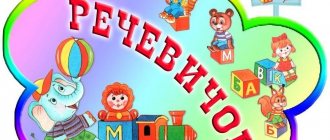Word games are a real salvation for parents. They can keep your child occupied in line, on the train, in the car, on the way to the metro... In short, when you need to pass the time, but there is nothing at hand. Or everything is there, but it has become boring.
Word games are very useful - they develop speech, memory, imagination, thinking, enrich vocabulary, and train phonemic hearing. And they're just fun to play! With the right word game, time flies.
This collection contains 14 games, arranged in increasing difficulty.
"I see something..."
The driver makes a wish for an object that is in the players’ field of vision: “I see something...” and names the color, shape, first letter of the word, etc. Players must guess the item.
The game is remarkable because it can be played with kids, making something very simple, and with older children. If you see that the child can cope easily, you can limit it to two or three attempts.
Example: “I see something green...” Players go through the options - a car, leaves on a tree, etc.
“I see something round...” (glasses on a person, road sign, traffic light, etc.)
4. "Words"
The first player says a word, the second player says a word starting with the last letter of the previous word.
Example: Shirt – Archaeologist – City – House, etc.
A more difficult option: come up with words starting with the last two letters of the previous word.
Example: TelnyashKA – KayuTA – Taxi – Syrup, etc.
Attention! In the complicated version, there may be words whose last two letters do not allow forming a word (for example, “foreigner”, “character”). If all players agree that a new word cannot be formed from the last two letters, then in this case the last letter is taken for word formation, as in the usual version of the game.
8. "Poker"
This fun word game is especially popular with kids. Ask the children to make a wish for any piece of furniture (chair, armchair, etc.) or kitchen utensil (fork, poker, rolling pin, etc.).
Then the driver asks the players various questions, which must be answered only with the hidden word.
Example: What is your name? - Poker.
What did you have for breakfast today? - Poker.
What gift did you receive for your birthday? - Poker.
Another version of the game: players think of words for each other, which they will then use to answer the driver.
Complication: You can't laugh.
Writing games
Encyclopedia
Not the fastest, but extremely exciting game for a company of four people - you will need pens, paper and some kind of encyclopedic dictionary (preferably not limited thematically - that is, the TSB will be better suited than the conventional “biological encyclopedia”). The presenter finds a word in the encyclopedia that is unknown to anyone present (here we can only rely on their honesty - but cheating in this game is uninteresting and unproductive). The task of each player is to write an encyclopedic definition of this word, coming up with its meaning out of their heads and, if possible, disguising the text as a real small encyclopedic article. Meanwhile, the presenter carefully rewrites the real definition from the encyclopedia. After this, the “articles” are mixed and read by the presenter in random order, including the present one, and the players vote for which option seems most convincing to them. Finally, the votes are counted and the points are distributed. Any player receives a point for correctly guessing the real definition and another point for each vote given by other participants to his own version. After this, the sheets are given back and a new word is played out - there should be about 6-10 of them in total. This game can also be played in teams: come up with imaginary definitions collectively. The game “poems” is structured in a similar way - but instead of a complex word, the presenter selects two lines from some little-known poem in advance and invites the participants to complete the quatrains.
Game from Inglourious Basterds
A game for a company of any size, which many knew before the Quentin Tarantino film, but it does not have a single name. Each player comes up with a role for his neighbor (usually it is some famous person), writes it on a piece of paper and sticks the piece of paper on his neighbor’s forehead: accordingly, everyone sees what role everyone has, but does not know who they themselves are. The participants’ task is to use leading questions, the answers to which are formulated as “yes” or “no” (“Am I a historical figure?”, “Am I a cultural figure?”, “Am I a famous athlete?”), to find out who exactly they are. In this form, however, the game exhausts itself quite quickly, so you can come up with completely different themes and, instead of famous people, play, for example, professions (including exotic ones - “carousel driver”, “taxidermist”), film and literary characters (you can mix them with real celebrities, but it’s better to agree on this in advance), in food (one player will be risotto, and the other, say, green cabbage soup) and even just in objects.
ABC Trim, alphabet enchanté. Illustrations by Bertal. France, 1861 Wikimedia Commons
Bulls and cows
A game for two: one participant thinks of a word, and it is agreed in advance how many letters it should contain (usually 4-5). The second's task is to guess this word by naming other four- or five-letter words; if some letters of the named word are in the hidden word, they are called cows, and if they have the same place inside the word, then they are bulls. Let’s imagine that the word “eccentric” is in your mind. If the guesser says “dot”, then he receives the answer from the second player: “three cows” (that is, the letters “ch”, “k” and “a”, which are in both “eccentric” and “dot”, but in different places). If he then says “cob”, he will no longer get three cows, but two cows and one bull - since the letter “a” in both “eccentric” and “cob” is in the fourth position. As a result, sooner or later they manage to guess the word, and the players can change places: now the first one will guess the word and count the bulls and cows, and the second one will name their options and track the extent to which they coincide with the guessed word. You can complicate the process by simultaneously guessing your word and guessing the opponent’s word.
Intelligence
A written game for a group (but can be played by two), consisting of three rounds, each lasting five minutes. In the first, players randomly type thirteen letters (for example, by blindly pointing a finger at a book page) and then make words from them, and only long ones - five letters or more. In the second round, you need to select a syllable and remember as many words as possible that begin with it; you can use words with the same root (for example, if the syllable “house” is chosen, then the words “house”, “domra”, “domana”, “domain” will do). “brownie”, “housewife”, etc.). Finally, in the third round the syllable is taken again, but now you need to remember not ordinary words, but the names of famous people of the past and present in which it appears, and not necessarily at the beginning - that is, both Karamzin and McCartney are suitable for the syllable “kar” , and, for example, Hamilcar. An important detail: since this con provokes the most controversy and cheating, the participants in the game can ask each other to prove that this person is really a celebrity, and here you need to remember at least your profession and country. Typical dialogue: “What, you don’t know Hamilcar? But this is a Carthaginian commander! After each round, points are calculated: if a particular word is the same for all players, it is simply crossed out, in other cases, players are awarded as many points for it as their opponents could not remember it. In the first round, you can also add points for particularly long words. Based on the results of the rounds, you need to determine who took first, second, third and other places, and at the end of the game these places are added up. The goal is to get the smallest number at the output (for example, if you were the winners of all three rounds, then you will get the number 3 - 1+1+1, and you are a champion; it cannot be less mathematically).
ABC Trim, alphabet enchanté. Illustrations by Bertal. France, 1861 Wikimedia Commons
Frame
A game for any number of people, which was invented by one of the creators of the chess program “Kaissa” and the author of the program for finding anagrams, Alexander Bitman. First, players choose several consonants - this will be the frame, the skeleton of the word. Then the time is noted (two to three minutes), and the players begin to “stretch” vowels (as well as “й”, “ь”, “ъ”) onto the frame to form existing words. Consonants can be used in any order, but only once, and vowels can be added in any number. For example, players choose the letters “t”, “m”, “n” - then the words “fog”, “manto”, “mantle”, “coin”, “darkness”, “ataman”, “muteness” and other. The winner is the one who can come up with the most words (as usual, these must be singular common nouns). The game can be played even with one letter - for example, “l”. The words “il”, “bark”, “yula”, “aloe”, “spruce” are formed around it, and if it is agreed that the letter can be doubled - “alley” and “lily”. If the standard “framework” has been mastered, then the task may be to compose an entire phrase with one consonant: a textbook example from the book by Evgeniy Gik - “Bobby, kill the boy and beat the woman at the baobab tree.”
Chain of words
A game for any number of players. Many people know it under the name “How to make a molehill out of a molehill,” and it was invented by the writer and mathematician Lewis Carroll, the author of “Alice.” The “chain” is based on metagram words, that is, words that differ in only one letter. The players' task is to turn one word into another with the least number of intermediate links. For example, let’s make a “goat” from a “fox”: FOX - LINDEN - PAW - KAPA - KARA - BARK - GOAT. It is interesting to give tasks with a plot: so that “day” turns into “night”, “river” becomes “sea”. The well-known chain, where the “elephant” grows from the “fly”, is obtained in 16 moves: FLY - MURA - TURA - TARA - KARA - KARE - CAFE - KAFR - MUSTER - SKAY - HOOK - ARINK - LESSON - DEADLINE - STOCK - MOAN - ELEPHANT (example by Evgeny Gik). To practice, you can compete in finding metagrams for a word. For example, the word “tone” gives “sleep”, “background”, “current”, “tom”, “tan” and so on - whoever gets the most options wins.
ABC Trim, alphabet enchanté. Illustrations by Bertal. France, 1861 Wikimedia Commons
Hat
A game for a company of four people, requiring simple equipment: pens, paper and a “hat” (an ordinary plastic bag will do). Sheets of paper need to be torn into small pieces and distributed to the players, the number of pieces depends on how many people are playing: the larger the company, the less for each person. Players write words on pieces of paper (one for each piece of paper) and throw them into the “hat”. Here, too, there are options - you can simply play with words (noun, common noun, singular), or you can play with famous people or literary characters. Then the participants are divided into teams - two or more people in each; Everyone’s task is to explain to their teammates in 20 seconds (or 30, or a minute - the timing can be set according to your own choice) the largest number of words randomly pulled out of the “hat”, without using the same roots. If the driver could not explain a word, it returns to the hat and will be played by the other team. At the end of the game, the words guessed by different representatives of the same team are summed up, their number is counted, and the team with the most pieces of paper is awarded the victory. A popular version of the game: everything is the same, but in the first round the players explain the words (or describe the characters) orally, in the second they show them in pantomime, in the third they explain the same words in one word. And recently a board game appeared, where you not only need to explain and show, but also draw.
“I’m going on a hike and taking with me...”
The driver says the first phrase: “I’m going on a hike and taking with me...” Then he adds any word that suits the meaning. The next player repeats the phrase and adds a word of his own.
The game continues until the players are able to repeat the entire phrase.
Example: “I’m going on a hike and taking with me... a bowler hat.”
“I go camping and take a bowler hat and matches with me.”
“I’m going on a hike and take a pot, matches and a knife with me,” etc.
By the way, the first phrase can be not only about the hike. For example: “I go to the store and buy there...”, “I go to visit and take with me...”, etc.
Oral games
Associations
A game for a large company. The presenter leaves the room for a short time, during which time the others decide which of those present they will wish for (this could be the presenter himself). Having returned, the player asks the others questions - what flower do you associate this person with, what vehicle, what part of the body, what piece of kitchen utensils, etc. - to understand who the mystery is. The questions can be very different - this is not limited by anything except the imagination of the players. Since association is an individual matter and an exact match may not happen, it is customary to give the guesser two or three attempts. If the company is small, you can expand the circle of guesses with mutual acquaintances who are not present in the room at that moment, although the classic version of “associations” is still a hermetic game.
Game of P
A game for a group of four people, an interesting variation on the “hat” theme (see below), but not requiring any special accessories. One player thinks of a word for another, which he must explain to the others, but he can only use words starting with the letter “p” (any except those with the same root). That is, the word “house” will have to be explained, for example, like this: “built - I live.” If you couldn’t guess right away, you can throw in additional associations: “building, room, space, the simplest concept...” And at the end add, for example, “Perignon” - by association with Dom Perignon champagne. If the guessers are close to winning, then the presenter will need comments like “approximately”, “approximately”, “almost correct” - or, in the opposite situation: “bad, wait!” Usually, after the word is guessed, the person explaining comes up with a new word and whispers it in the ear of the person who guessed it - he becomes the next leader.
Lectures for children on this topic:
A course of lectures for children about the languages of the world
How many languages are there in the world, how do they differ and how are they similar to each other?
A course of lectures for children about strange and new words in the Russian language
Why do linguists study jargon, filler words and speech errors?
ABC Trim, alphabet enchanté. Illustrations by Bertal. France, 1861 Wikimedia Commons
Say the Same Thing
A fun and fast game for two, which got its name from the video of the inventive rock band OK Go, from which many learned about it (the musicians even developed a mobile application that helps you play it from a distance, although it is currently unavailable). The point of the game is that on the count of one-two-three, each player pronounces a word of his choice. Next, the goal of the players is to, with the help of successive associations, come to a common denominator: the next time, two, three, both pronounce a word that is somehow connected with the previous two, and so on until the desired coincidence occurs. Let's assume that the first player said the word "house" and the second said the word "sausage"; in theory, they can coincide very soon if on the second move, after one-two-three, both say “store.” But if one says “store” and the other says “refrigerator” (why not a house for sausage?), then the game may drag on, especially since it cannot be repeated - neither the store nor the refrigerator will fit anymore, and you will have to figure out, say, "reefer" or "IKEA". If the initial words are far from each other (for example, “curb” and “weightlessness”), then the gameplay becomes completely unpredictable.
Characters
A game for a group (the ideal number of players is from four to ten), requiring from the participants not only good imagination, but also, preferably, a little bit of acting skill. As usual, one of the players leaves the room for a while, and while he is gone, the rest come up with a word, the number of letters in which coincides with the number of participants remaining in the room. Next, the letters are distributed among the players, and a character is invented for each of them (therefore, words that contain “ъ”, “ы” or “ь” are not suitable). Until the word is guessed, the players behave in accordance with the chosen character - the presenter’s task is to understand exactly what characters his partners are portraying and restore the hidden word. Let's imagine, for example, that a company consists of seven people. One leaves, the rest come up with the six-letter word “old man” and distribute roles among themselves: the first, say, will be with the indoor one, the second will be patient , the third will be secondary, the fourth be cordial, the fifth will the mane, and the sixth will be with the ovarian. The returning player is greeted by a cacophony of voices - their roles until they are solved, and the presenter asks the players questions that help reveal their character. The only condition is that as soon as the presenter pronounces the correct character - for example, guesses the insidious one - he must admit that his incognito has been revealed and announce the number of his letter (in the word “old man” - sixth).
ABC Trim, alphabet enchanté. Illustrations by Bertal. France, 1861 Wikimedia Commons
Find out the song
A game for a group of four to five people. The leader leaves, and the remaining players choose a well-known song and distribute its words among themselves - a word to each. For example, the song “Let there always be sun” is made: one player gets the word “let”, the second - “always”, the third - “there will be”, the fourth - “sun”. The presenter returns and begins to ask questions - very different and unexpected: “What is your favorite city?”, “Where does the Volga flow?”, “What to do and who is to blame?”. The task of the respondents is to use their word in the answer and try to do it so that it does not stand out too much; You need to answer quickly and not at too much length, but not necessarily truthfully. The answers to the questions in this case could be, for example, “It’s difficult for me to choose one city, but let it be Rio de Janeiro today” or “The Volga flows into the Caspian, but this does not always happen, every third year it flows into the Black” . The presenter must figure out which word is the odd one out in the answer and guess the song. They often play with lines from poetry rather than songs.
Tip
A game for four people, divided into pairs (in principle, there can be three or four pairs). The mechanics are extremely simple: the first player from the first pair whispers a word (common noun in the singular) into the ear of the first player from the second pair, then they take turns calling out their associations with this word (in the same form - common nouns; cognate words cannot be used ). After each association, the teammate of the player who voiced it names his word, trying to guess whether it was the one that was originally thought of, and so on until the problem is solved by someone; at the same time, all associations already heard in the game can be used in the future, adding one new one at each move. For example, let there be players A and B on one team, and C and D on the other. Player A whispers the word “old man” into player C’s ear. Player C says "age" out loud to partner D. If D immediately answers “old man,” then the pair C and D have earned a point, but if he says, for example, “youth,” then the turn goes to player A, who, using the word “age” suggested by C (but discarding the irrelevant to the case “youth” from D), says to his partner B: “age, man.” Now B will probably guess the old man - and his team with A will already score a point. But if he says “teenager” (deciding that we are talking about the age when boys turn into men), then C, who has suddenly returned to action, will say “ age, man, eighty years old,” and here, probably, “old man” will be guessed. In one of the variants of the game, it is also allowed to “shout”: this means that, having suddenly realized what was meant, the player can shout out the option on a wrong turn. If he guessed right, his team will get a point, but if he was too hasty in drawing conclusions, his team will lose a point. They usually play up to five points.
ABC Trim, alphabet enchanté. Illustrations by Bertal. France, 1861 Wikimedia Commons
Ministry of Railways
A game for a large company. Here we are forced to warn readers that after seeing this text in full, you will never be able to drive again - the game is one-time only.
Spoiler →
First, the player who gets to lead leaves the room. Having returned, he must find out what MPS means - all that is known in advance is that the bearer of this mysterious abbreviation is present in the room right now. To find out the correct answer, the driver can ask other players questions, the answers to which should be formulated as “yes” or “no”: “Does he have blond hair?”, “Does he have blue eyes?”, “Is he a man?”, “He in jeans?”, “Does he have a beard?”; Moreover, each question is asked to a specific player, and not to all at once. Most likely, it will become clear quite quickly that the person who meets all the criteria is simply not in the room; Accordingly, the question will arise on what principle the players give answers. “An autopsy” of this principle will help answer the main question - what is MPS. The Ministry of Railways is not the Ministry of Railways at all, but my right- hand neighbor ( that is, each player always describes the person sitting to his right). Another option is KOP, who answered last ( , everyone talks about who answered the previous question).
Contact
A simple game that can be played with a group of three people. One person thinks of a word (noun, common noun, singular) and names its first letter out loud; the others’ task is to guess the word, remembering other words starting with this letter, asking questions about them and checking to see if the leader has guessed it. The presenter’s task is to avoid revealing the next letters in the word to the players for as long as possible. For example, a word starting with the letter “d” is guessed. One of the players asks the question: “Is this by any chance the place where we live?” This is where the fun begins: the presenter must quickly figure out what the player means and say “No, this is not a “house”” (or, if it was a “house”, honestly admit it). But at the same time, other players are thinking about the same thing, and if they understand before the leader that “house” is meant, then they say: “contact” or “there is contact,” and begin to count in unison to ten (while the count is going on, the presenter still has a chance to escape and guess what is being said!), and then the word is called. If at least two of them matched, that is, on the count of ten they said “house” in unison, the leader must reveal the next letter, and the new version of the guessers will already begin with the now known letters “d” + next. If it was not possible to beat the presenter on this question, then the guessers offer a new option. Of course, it makes sense to complicate the definitions rather than ask everything directly - so the question about “home” would be better sounded like “Isn’t it where the sun rises?” (with a reference to the famous song “House of the Rising Sun” by The Animals). Usually, the one who ultimately gets to the searched word (names it or asks a question that leads to victory) becomes the next leader.
ABC Trim, alphabet enchanté. Illustrations by Bertal. France, 1861 Wikimedia Commons





